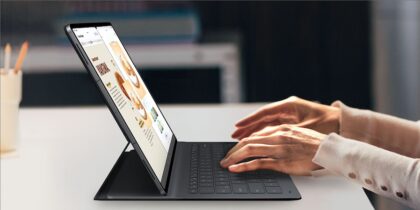Smartphones connect us with colleagues around the world, allowing us to respond quicker, collaborate more efficiently, streamline workflows or access corporate data via apps. But when it comes to having a healthy work-life balance, overuse of smartphones can cause problems.
The way we work has changed radically and, without the right checks and balances, ever-present mobile devices can impact our personal lives. If you’re like a lot of people, the first thing you do in the morning is you grab your smartphone to check work emails, respond to notifications and perform a number of work-related tasks that you feel can’t wait until you get to the office. Although smartphones provide a variety of benefits, including staying connected away from the office, a Frost & Sullivan survey revealed that smartphones also add pressure to stay connected. In the survey, 39 percent of respondents reported feeling this pressure, and 35 percent of respondents said that smartphone usage for business had a major impact on work-life balance.
While smartphones have become a boon for mobile productivity, they can have a negative impact on our ability to relax and spend quality time with our friends and family. That’s why smartphone users need to implement practical solutions to help them achieve a healthier work-life balance.
Here are three tips that can help you get the most out of your smartphone without sacrificing your personal life:
1. Let Apps Help You
Research by Arnold Bakker, a professor of work and organizational psychology at Erasmus University in Rotterdam, has shown that employees who are given smartphones by their employer feel obligated to be on call at all times, causing “work-home interference” and making it “difficult, if not impossible, for mobile users to maintain a satisfactory balance between their work and personal life.”
One solution to this problem is to take the decision out of your hands. If you find you just can’t stop yourself from answering those emails or checking Slack for notifications, you can download an app that will lock you out of those situations. OFFTIME is a free app for Android that lets users block calls and messages from certain contacts, restrict access to certain apps during certain times of the day and even track their phone usage to see how much they’re using it while away from work.
2. Do Your Work at the Office
If you’re focused and more productive during your regular office hours, then you shouldn’t feel the need to compensate at home when you could be spending time with your family or catching up on the latest Netflix show.
“Our days are being occupied by things that don’t matter most of the time,” Jason Fried, author of The New York Times best-seller “Rework” and founder of Basecamp, told Mashable. “We’re just talking. There’s a big difference between constant conversations and meetings and actually getting work done.”
If you have difficulty getting things done at work, apps can be your best friend. They can help you organize your time better so you stay focused on the tasks you need to complete each day. Ultimately, however, this comes down to each individual wanting to become more productive in the office so that free time really is free time.
3. Stick to Your Schedule
One of the biggest problems employees today face is meeting the expectation to be on call and available to answer emails and other queries at all times. While this is partly due to the changing nature of how we work and our increased focus on mobile productivity, it can also be a result of failing to set boundaries.
Your employer may have given you a smartphone for work, but in most cases, that doesn’t mean you’re on call 24/7. Employees need to communicate this from the beginning, creating a clear work schedule and rules for when they can be expected to be available outside of those hours.
Everyone’s job is different, with varying levels of responsibility, but in all situations, clear boundaries should be established between your work and personal life. “Technology is expanding the workday,” Laura Garnett, performance strategist at Garnett Consulting, told Forbes. “We’re expected to be on call 24/7. Technology is so addictive — it’s easy to let that take away your balance. We need to be proactive about our downtime.”
Ultimately, it’s up to you to improve your work-life balance by limiting the amount of time you spend on your smartphone. Clearly define the boundaries between work and home life. Stick to a schedule and share it with your colleagues and supervisors. Sometimes you just need to put your phone down and do something else. You’ll achieve a much healthier work-life balance that benefits everyone.
As the workplace becomes more digital, enterprises must create an environment that uses cutting-edge technology to encourage innovation and flexibility.








